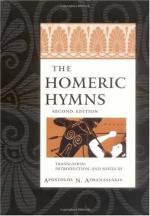Hard by is a fair-flowing stream, and there, with an arrow from his strong bow, did the Prince, the son of Zeus, slay the Dragoness, mighty and huge, a wild Etin, that was wont to wreak many woes on earthly men, on themselves, and their straight-stepping flocks, so dread a bane was she.
[This Dragoness it was that took from golden-throned Hera and reared the dread Typhaon, not to be dealt with, a bane to mortals. Him did Hera bear, upon a time, in wrath with father Zeus, whenas Cronides brought forth from his head renowned Athene. Straightway lady Hera was angered, and spake among the assembled Gods:
“Listen to me, ye Gods, and Goddesses all, how cloud-collecting Zeus is first to begin the dishonouring of me, though he made me his wife in honour. And now, apart from me, he has brought forth grey-eyed Athene who excels among all the blessed Immortals. But he was feeble from the birth, among all the Gods, my son Hephaestos, lame and withered of foot, whom I myself lifted in my hands, and cast into the wide sea. But the daughter of Nereus, Thetis of the silver feet, received him and nurtured him among her sisters. Would that she had done other grace to the blessed Immortals!
“Thou evil one of many wiles, what other wile devisest thou? How hadst thou the heart now alone to bear grey-eyed Athene? Could I not have borne her? But none the less would she have been called thine among the Immortals, who hold the wide heaven. Take heed now, that I devise not for thee some evil to come. Yea, now shall I use arts whereby a child of mine shall be born, excelling among the immortal Gods, without dishonouring thy sacred bed or mine, for verily to thy bed I will not come, but far from thee will nurse my grudge against the Immortal Gods.”
So spake she, and withdrew from among the Gods with angered heart. Right so she made her prayer, the ox-eyed lady Hera, striking the earth with her hand flatlings, {121} and spake her word:
“Listen to me now, Earth, and wide Heavens above, and ye Gods called Titans, dwelling beneath earth in great Tartarus, ye from whom spring Gods and men! List to me now, all of you, and give me a child apart from Zeus, yet nothing inferior to him in might, nay, stronger than he, as much as far-seeing Zeus is mightier than Cronus!”
So spake she, and smote the ground with her firm hand. Then Earth, the nurse of life, was stirred, and Hera, beholding it, was glad at heart, for she deemed that her prayer would be accomplished. From that hour for a full year she never came to the bed of wise Zeus, nor to her throne adorned, whereon she was wont to sit, planning deep counsel, but dwelling in her temples, the homes of Prayers, she took joy in her sacrifices, the ox-eyed lady Hera.
Now when her months and days were fulfilled, the year revolving, and the seasons in their course coming round, she bare a birth like neither Gods nor mortals, the dread Typhaon, not to be dealt with, a bane of men. Him now she took, the ox-eyed lady Hera, and carried and gave to the Dragoness, to bitter nurse a bitter fosterling, who received him, that ever wrought many wrongs among the renowned tribes of men.]




